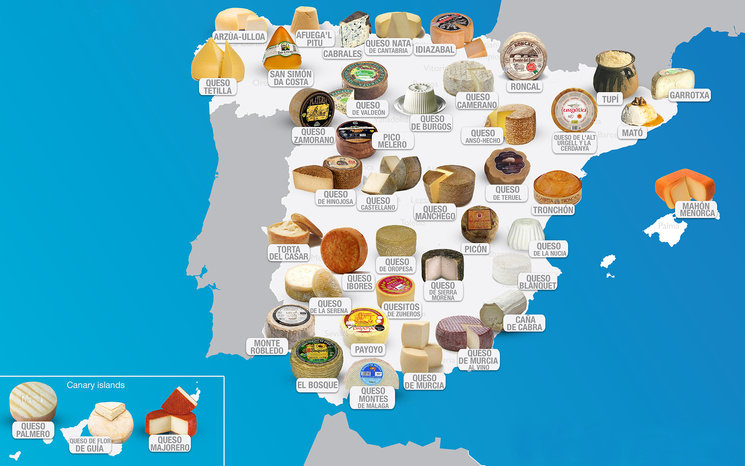Spain is a country with a great diversity and gastronomic culture in general and in the cheese industry in particular. Thanks to the centuries-long tradition of livestock farming, Spanish artisanal cheese products are excellent culinary products and one of the best categories of products with a protected designation of origin. The export of the cheese industry in Spain is increasing year by year, making our best cheeses known on international markets. Exporting is a new way to market our cheeses and many manufacturers already consider this option as a sustainable way to increase their sales. But like any export, this market requires quality products. And in this case nothing better than the Protected Designation of Origin (PDO) label to give prestige to our cheese industry. Let’s get to know the most important ones.

The cheese industry in Spain presents its best PDOs
Cabrales: Asturian qualities that make it a classic in the Spanish cheese industry
If we are talking about the important cheese industry in Spain, it is unthinkable not to start with one of the most popular AOC products: Cabrales cheese. Obtained from cow’s, sheep’s and goat’s milk, Cabrales avec is recognizable by its unique blue appearance and characteristic smell.
The cheese of this Asturian village is one of the strongest on the Spanish market. Cylindrical in shape and with flat faces, its height varies from 7 to 15 cm, and its soft and fine natural rind due to maturation in natural caves with high humidity.
The other Asturian PDO cheeses are Gamoneu, Afuega´l Pitu or Casin. All these cheeses are already distributed in the Middle East (particularly in Saudi Arabia, Jordan, Dubai and Lebanon).
The Spanish cheese industry presents its best PDOs
Idiazábal cheese and northern cheeses
The dairy product used to make Idiazábal cheese comes from Texel, the sheep breed. Texel is a rustic sheep from this part of the Basque Country, producing a superior quality milk that is highly prized throughout the world, which gives another prestigious aspect to the Spanish cheese industry.
One of the main characteristics of this cheese is that it is made from raw milk, matured for at least 2 months. Its size is small or medium, and it has enzymatic coagulation. It is a hard raw cheese and can be found on the market either smoked or non-smoked.
Other important cheeses from the Cantabrian region with PDO are Picón Bejes or Camerano.
Galician cheeses and the essential Tetilla
An essential element in Galician gastronomy is Tetilla PDO cheese. Made with cow’s milk from the Frisona, Brown Alpina and Rubia Gallega breeds, it is one of the most representatives in the region. It is particularly recognizable because of its shape, which recalls the nipples of a mother, where the name comes from.
In order to obtain PDO certification, cows and the entire manufacturing process must ensure a series of detailed criteria, ranging from the type of hygiene conditions when milking animals, to production and storage temperatures.
Other important cheeses in the area are Arzúa or Cebreiro.
The export of Galician cheeses is growing 4 times more than the export of other cheeses from the peninsula. Its main target markets are the United States, Asia and Europe.
The famous Manchego cheese and cheeses from the south
Manchego cheese is the cheese made in the Castilla-La Mancha region from raw or pasteurised sheep’s milk from the Manchega breed. The maturing lasts at least 70 days.
In the Mediterranean area, there are also major PDO cheeses, such as those from Murcia and the famous Murcia wine cheese. But there is also the Palmero of the Canary Islands or the Ibores cheese, made with goats of the Serranas, Veratas or Retintas breed fed in the Mediterranean forests.
They are by far the most exported and best known Spanish cheeses outside our borders.
Other links of interest:
The trend of the wine sector in China
Global wine trends and trade shows
The gastronomic market in France
Vinisud and Vinovision 2019, two major French wine shows
A new edition of Sial Paris is coming
The organic wine market in France
Case of success: La Cuina de la Iaia and its gourmet croquettes



